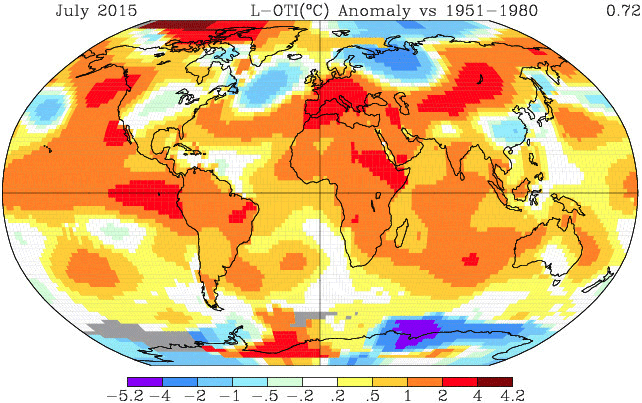Earth warmed to a maximum level in 4000 years

According to preliminary data from NASA, as well as the Japan Meteorological Agency , July 2015 was the hottest month on earth for all the time of observation, that is, from the end of the 19th century.
Scientists have studied circumstantial evidence: tree rings, ice cores and coral formations on the ocean floor. These data suggest that the Earth is now heated to a maximum level in the last 4,000 years .
The collected NASA statistics will be refined and analyzed in the coming weeks and months, but now it turns out that the temperature in July 2015 exceeded the previous record set in July 2011 by 0.02ºC. Each month of this year was among the four hottest corresponding months in the entire history of observations, according to NASA.
')
NASA and other agencies use slightly different methods to calculate the average monthly and average annual temperature, so the results are slightly different, although the base with the statistics is almost the same. For example, the following graph shows the average monthly temperature in July for the years 1890-2015, according to the Japan Meteorological Agency.

Apparently, this year will also set an absolute record for the entire measurement time, if it does not sharply cool in the autumn all over the world. But this is unlikely to happen, given the onset of an El Niño temperature anomaly, which is expected to be particularly strong this year.
The hottest month in human history has led to the fact that in many cities of Europe, Asia and America absolute temperature records have been set for the entire measurement period. The streets literally melt asphalt, and on the hood of cars you can fry eggs.

Minsk, August 11, 2015. Photos from a thermal imager: Alexander Vasyukovich
For example, on July 9, a temperature of 39.9ºC in the shade was recorded in Madrid. Germany updated the national record on July 5 - 40.3ºC in the Bavarian town of Kitzingen.
The media report "thousands of deaths" due to the heat in India, Pakistan, Egypt and other countries.
With an increase in the average annual temperature by several degrees, scientists predict catastrophic consequences: rising sea levels, periods of extreme heat, mass extinction of species and an increase in the number of natural disasters. Perhaps last July was a kind of warning for humanity.
Some climatologists believe that global warming is associated with human activity in the industrial age.
Source: https://habr.com/ru/post/368001/
All Articles